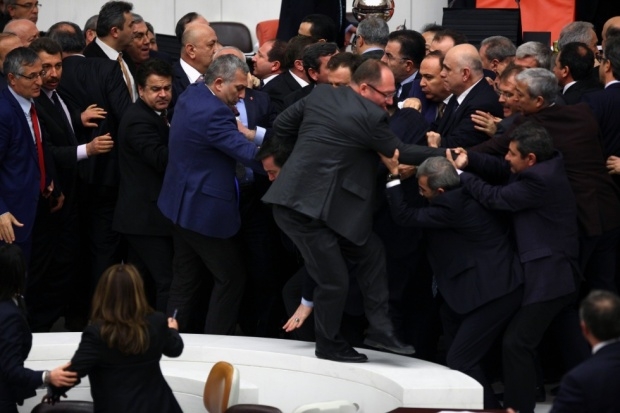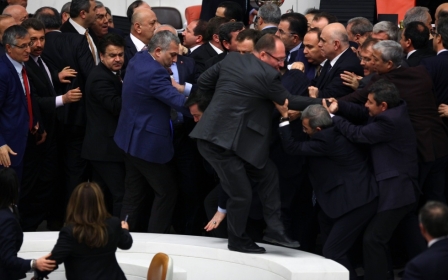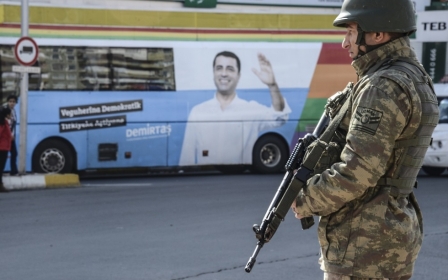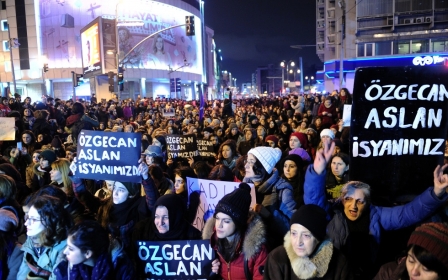ANALYSIS: Turkey's new policing law - another blow to democracy?

The parliamentary talks for the new controversial domestic security bill in Turkey have turned violent as the tension between MPs from opposition parties and the government culminated in sporadic brawls last week.
In the wake of recent political tensions in the country, the government decided to revise the existing laws for the prevention of crime and terror activities. The preamble of the bill states that the government aims to deter violence in mass demonstrations as well as protect public order.
For this reason, the bill gives further rights to police forces for detention procedures and use of violence. However, since the drafting process, it has been highly criticised by the opposition parties as well as the Union of Turkish Bar Associations, Turkey's largest professional organisation in the judiciary.
Postponed twice before the latest rounds of talks, the tactical warfare between the opposition parties and the Justice and Development Party (AKP) government has reached a deadlock.
During the closed session of parliament last Tuesday, five MPs were injured with minor bruises. While the mainly Kurdish opposition Peoples' Democratic Party (HDP) members attempted to block the legislation process, AKP members allegedly attacked them with the aim of removing them from the speech stand.
On the same day, two women MPs from HDP ranks, Pervin Buldan and Sebahat Tuncel, attempted to occupy the speech stand and were pushed away by the AKP MP Mustafa Elitas.
Prime Minister Ahmet Davutoglu criticised Buldan and Tuncel for “using their womanhood” to hold the AK party members responsible for the quarrel. When asked his opinion on the incident, Davutoglu said: "They are using their womanhood as a tool for provocation. In the wake of the psychological mood after the Ozgecan tragedy, they are trying to give the impression that the AK Party is attacking women."
He was referring to the gruesome rape and death of 20-year-old Ozgecan Aslan in the southern city of Mersin earlier last week and the nationwide reactions to the incident.
HDP member Sirri Sureyya Onder was furious with the AKP MPs aggressive behaviour. Last Wednesday he warned government party MPs to stay away from their members and "keep their distance at sword's length."
The general assembly could only start the voting session on Saturday evening. HDP members, along with other opposition parties, started a sit-in protest to block the legislation.
As of Tuesday morning, only 16 out of 132 individual articles have been legislated.
What's inside?
The bill introduces significant changes in police detention procedures and authorises security forces to exercise tighter control over mass demonstrations. Among the 132 articles, however, only a dozen of the most contentious proposals have become the source of parliamentary quarrels.
Perhaps most importantly, the bill allows provincial governors to undertake criminal investigations and take precautionary measures to prevent crimes. New overarching powers allow the governors to mobilise all the public institutions to fight against crime with the exception of employing military forces.
According to Cem Duran Uzun, law professor at Cankaya University, among all the changes, the extended governor authority appears to be the most dangerous regulation. "Crime investigation is a judicial matter; an administrative authority should not be vested with judicial powers," he told Middle East Eye.
"Transferring a judicial authority to an administrative body is a direct breach of the constitution and against the principle of checks and balances."
Moreover, the bill permits the police to exercise extended detention rights up to 48 hours on the basis of "reasonable doubt". Currently, security forces can only detain individuals with a written order by the prosecutor.
The main opposition Republican People's Party (CHP) argues that this change practically gives the police forces the role of prosecutors, potentially leading them to take arbitrary measures, especially during mass demonstrations.
Following a similar law amendment in December 2014, the conditions for search procedures of suspects and their possessions changed from "concrete evidence" to "reasonable doubt." The first application of the "reasonable doubt" clause was when the Zaman newspaper and Samanyolu television offices were raided in late 2014.
And for Uzun, since the current bill grants the police the right to detain suspects without a written order by the prosecutor, the combination of both laws could result in widespread arbitrary practices.
It is not surprising that the AKP justified the package with a direct reference to Kobane protests across Turkey on 6-7 October that brought thousands of Kurds on the streets protesting at the government's inaction over the Islamic State's (IS) attack on the Syrian border town of Kobane.
During the Kobane protests, more than 40 people lost their lives in several cities of Turkey, mostly in the Kurdish populated southeast. Additionally, in the face of rising threats from the Islamic State beyond its southern border, Turkey had to face new challenges in dealing with IS without jeopardising its internal security.
Preventive measures
Among some minor fixes, the new bill also gives the police the right to body search citizens and enforce "travel restrictions" on them. Accordingly, with the extended rights, the police could undress and search individuals or their possessions without written authorisation from the prosecutor, and prevent them from entering certain areas or could deport them from restricted zones.
The police chief's verbal authorisation is necessary only with the condition to be presented to a judge within 24 hours. CHP opposes this regulation, arguing that the lack of written authorisation is unconstitutional, therefore could not be applied. With the same line of thinking, the party's overall stance is to block the contents of the bill that threaten democracy, rule of law and human rights.
The Nationalist Movement Party (MHP) also argues that with this bill, security forces will face no checks, and this could further limit individual rights and freedoms. While the party opposes the bill on the grounds of AKP's intention to transform provincial governors into representatives of the party, it also states that the current quarrel in parliament between the HDP and AKP is nothing more than a sham.
In contrast, the government says that the new law will play an important role in the prevention of crimes. The current law, amended in 2001 as a part of the EU law harmonisation packages, does not allow police forces to conduct searches without written consent by a prosecutor or judge.
According to Bulent Orakoglu at daily Yeni Safak, the opposition's reaction to the law has little to do with protecting the public interest, but rather is "an attempt to ferment chaos and street terror."
"This law package should immediately be put in place in the wake of recent mass demonstrations, especially the ones that turned into propaganda of the terrorist organisation [PKK] and posed a security threat against civilians as well as public offices," Orakoglu wrote recently.
An 'invitation to kill'
Perhaps the most controversial regulation is the authorisation of the use of firearms against petrol bombs, explosives and slingshots. Interior affairs commissioner and AK Party MP Idris Sahin argued that in the last six months petrol bomb attacks surged, with more than 5,000 individual incidents recorded, claiming the lives of seven people, four of them police officers.
"We are authorising the police to eliminate petrol bomb attacks and reduce the destruction of mass demonstrations," Sahin said. "Police forces would not act beyond their authority."
According to HDP co-chair Selahattin Demirtas, this regulation is not a precaution, but an invitation to extrajudicial killings. "Current law prescribes up to 20 years imprisonment for the use of petrol bombs and there are children in prison for such criminal offences," he said last week. "The new law will authorise the police to shoot those using petrol bombs […] This is called execution. The death penalty has long been abolished."
Though government circles offer reassurances on the proper use of authority, police forces' track record in Turkey tells another story. During the mass demonstrations of Gezi Park in the summer of 2013, six people (including one police officer) died due to direct hits from pepper gas canisters, crushing or police brutality.
For Uzun at Cankaya University, the new law is an invitation to police to use fire arms. "The new bill will only encourage security forces to resort to deadly force, which could be seen as a huge controversy given Turkey's conditions," he told MEE.
Failing practices
According to attorney-at-law Fikret Ilkiz, the lack of judicial orders will result in massive arbitrary measures, rendering virtually everybody as potential suspects. "Court orders prior to criminal searches will become obsolete and, if needed, only retrospective consent will be sought from the courts," he argued.
In fact, most of the existing regulations have been amended during the AKP government term, especially as Turkey was advancing judicial reforms to harmonise its laws with the EU regulations.
For instance, police detention procedures have been amended in 2005 and the authority of the security forces were decreased to avoid arbitrary practices. However, the government argues that preventive measures are commonplace practices in other EU countries and that current law diminishes the efficiency of the security forces.
Uzun believes that the government's actions are somewhat contradictory as it was the same government in 2005 that saw problems in policing practices and felt the need to reform them.
Referring to the use of firearms against petrol bombs, Uzun concluded: "At present, the police have the authority to resort to their weapons when needed. Old practices and abuses in the past, as we have seen at Gezi Park and the Kobane protests, might result in even further abuses."
Parliament has convened to vote through the remaining articles today. With the current haste and opposition efforts to block the process, the full legislation of the package might take days if not weeks.
-
New MEE newsletter: Jerusalem Dispatch
Sign up to get the latest insights and analysis on Israel-Palestine, alongside Turkey Unpacked and other MEE newsletters
Middle East Eye delivers independent and unrivalled coverage and analysis of the Middle East, North Africa and beyond. To learn more about republishing this content and the associated fees, please fill out this form. More about MEE can be found here.




